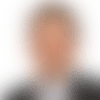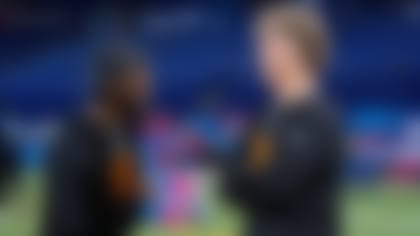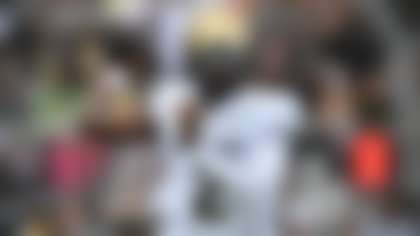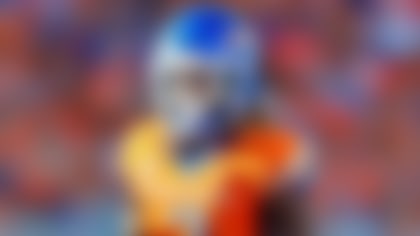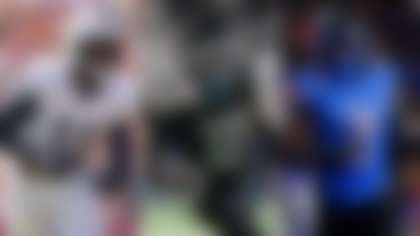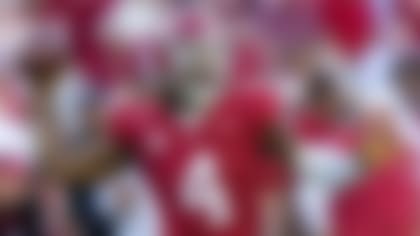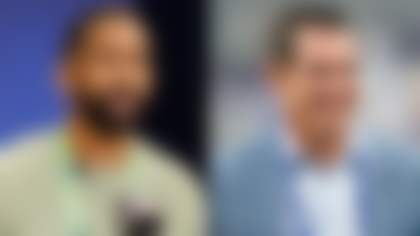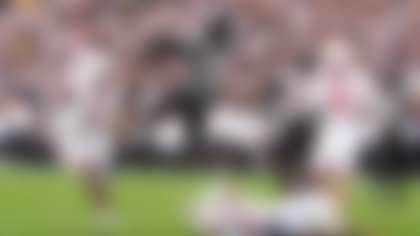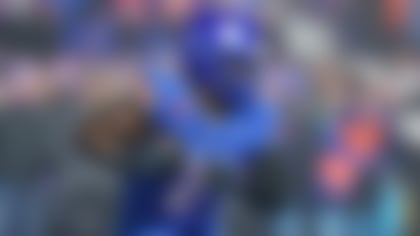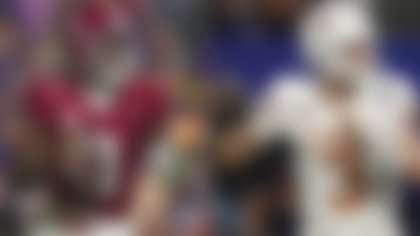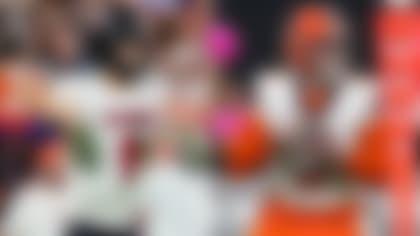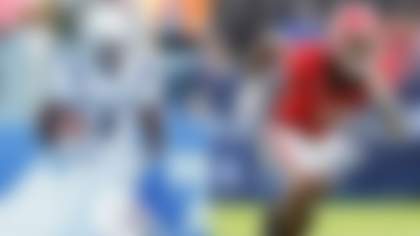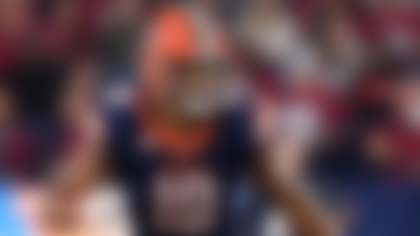With the 2012 NFL Draft and the bulk of free agency in the rearview mirror, NFL.com analyst Elliot Harrison is examining each team's offseason activity and identifying remaining holes to fill.
Arizona Cardinals
Free agency: The Cardinals got a key cog in free agency, picking up G Adam Snyder, a highly beneficial move because it simultaneously depleted the NFC West champion 49ers. Arizona also added James Sanders and William Gay to the mix in the secondary.
Draft: Arizona drafted the guy Larry Fitzgerald wanted, Notre Dame receiver Michael Floyd. Third-round CB Jamell Fleming (Oklahoma) could push A.J. Jefferson in camp. Three of the next five picks went toward offensive line, with Bobby Massie being a potential steal in the fourth round.
Holes to fill: The club retooled the line, but not with high draft picks. Arizona's tackles had their struggles in 2011, particularly Levi Brown, who gave up 11.5 sacks. Defensively, there is no question Ray Horton's squad played ball down the stretch last season, but the linebacking corps is strictly average. Expect Arizona to hit this group in the 2013 draft. The biggest remaining question with this organization is what to do at quarterback. Kevin Kolb and John Skelton will compete in camp, with the latter getting every opportunity to win the job. GM Rod Graves already paid Kolb a $7 million bonus this offseason, so plenty of money is invested in the former Eagle. Like several teams, the Cardinals are hanging in the balance of the ups and downs of their starting quarterback. Will it be the once highly touted Kolb or former fifth-round pick Skelton? Remember, the Cards went 6-2 in games Skelton played last season.
San Francisco 49ers
Free agency: The Niners set out to upgrade the wide receiver position, grabbing Randy Moss and Mario Manningham off the open market. The 49ers also added RB Brandon Jacobs, QB Josh Johnson and RB Rock Cartwright, although their impact will likely be limited in comparison to Moss and Manningham.
Draft: The Niners continued to build a new-look receiving corps by drafting A.J. Jenkins in the first round. Second-round pick LaMichael James is a running back several teams had their eye on, and will spell the oft-dinged-up Frank Gore. Fourth-rounder Joe Looney will compete for a guard spot, which is one of the weaker areas on what is otherwise a championship-level team.
Holes to fill: The interior of the 49ers' offensive line is pretty average, though Alex Smith's quicker decision making helped cover this up last season. Smith played far better than he ever has in his first year with Jim Harbaugh. But while he was the least-intercepted quarterback in the league, there is always the possibility he could regress. Smith has enjoyed one good season out of seven in the league. Moreover, he struggled to convert third downs in the NFC Championship Game (1-for-13) and must take the next step for this team to win the Super Bowl. He's not yet a finished product. The defense? Try to find a weakness. One through 11, this group is as good as there is in the NFL. Perhaps you could nitpick defensive linemen Ray McDonald and Isaac Sopoaga, but they were pretty effective a year ago.
Seattle Seahawks
Free agency: Seattle made waves in free agency. Most prominently, they landed Matt Flynn to run the offense. But the club didn't stop there, signing two starters on defense in DT Jason Jones and LB Barrett Ruud. The Seahawks also built up some offensive line depth.
Draft: Considering some teams didn't have him going anywhere near the top half of the first round, DE/OLB Bruce Irvin was easily the most controversial pick of the first round. Pete Carroll defends the pick by claiming other teams selecting behind the Seahawks were interested in taking the West Virginia standout in Round 1. Let's just leave it at this: The Seahawks can't afford for Irvin to be a bust. Bobby Wagner was selected in the second round and could push Ruud in camp. All in all, Seattle spent no less than eight picks on the defense. Taking quarterback Russell Wilson in the third round was a surprising move.
Holes to fill: Like seemingly every team in the NFC West, the Seahawks will only go as far as their quarterback takes them. Flynn should be an upgrade over Tarvaris Jackson -- in theory -- but at the end of the day, he's only started two games in the NFL. And right behind him lurks another question mark in tailback Marshawn Lynch. He was downright awesome in some games during the second half of 2011, but how will he perform now that he's been paid? While the offensive line was much better than it was given credit for, the right side is merely OK (which, of course, affects Lynch's production). Flynn will need time to get the ball to a group of (largely) unproven receivers. Sidney Rice, Doug Baldwin and Golden Tate should be in line to make more plays with their new QB, but that remains to be seen. While the front seven has been retooled on defense, issues remain. How will Jones fare in a new locale? There are many around the league who feel he just isn't that special a player. When will age catch up to defensive end Chris Clemons, who's 30, but posted a team-high 11 sacks last season? (No one else on the Seahawks recorded more than four sacks last year.) Will Irvin or Wagner be able to start immediately at linebacker, or at least contribute in sub packages? For Seattle to be a threat in the West, the front seven has to put its stamp on games. Period.
St. Louis Rams
Free agency: With Jeff Fisher taking over, the Rams were one of the more active teams in free agency, acquiring at least four starters and several backups to fill out the depth chart. C Scott Wells and CB Cortland Finnegan were the big names, costing the team $37 million in guaranteed money. DE Kendall Langford and LB Jo-Lonn Dunbar are also expected to start. The most interesting name here might be WR Steve Smith, whose career was derailed by a knee injury and an inauspicious stint in Philadelphia. He could end up playing a key role for in St. Louis.
Draft: The Rams took the gargantuan Michael Brockers to hopefully start immediately at defensive tackle. Then they surprised a lot of folks by taking Appalachian State WR Brian Quick with the opening pick of the second round. Isaiah Pead will spell Steven Jackson often at running back. Fellow second-rounder Janoris Jenkins brings character concerns to St. Louis, but his raw talent could make this draft a complete success for Fisher.
Holes to fill: With a 2-14 team, there are always many voids. For this team, it even includes kicker. Greg Zuerlein will enter camp as the starter after coming off the board in the sixth round last weekend. Good luck in tight games ... (Which is exactly what the Rams figure to be playing in.) Of course, in order to stay in games, the defense must stop hemorrhaging rushing yards like it did last season (as evidenced by a run defense that allowed 152.1 yards per game, 31st in the league). With no defined defensive coordinator to replace the suspended Gregg Williams as of yet, St. Louis has a leadership void in a spot it shouldn't. Secondly, Dunbar and fellow linebacker Justin Cole will have to really step up if they both crack the starting lineup. This team just couldn't get a stop last season when it needed one. Offensively, the line was in shambles last season. Fisher has done his best to fix that, acquiring three free agents, including Wells. But none of that will matter, nor will the additions of Quick and Smith at wideout, if Sam Bradford doesn't take a step forward to combat the step he took back last season. His 70.5 passer rating was one of the worst in the league. It's time for him to play like a first overall pick.
Follow Elliot Harrison on Twitter _@HarrisonNFL_
